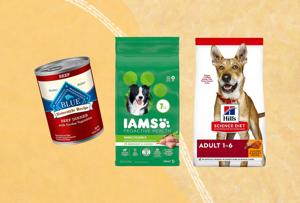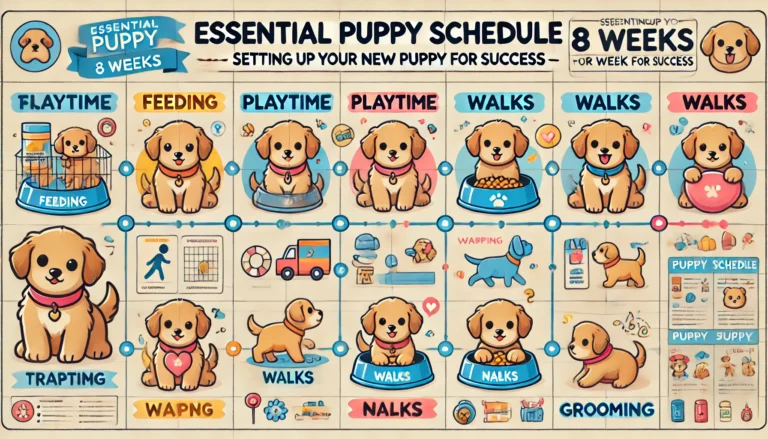Best Puppy Food Brands: Top Choices for Your Furry Friend’s Health
Picking the right food for your new puppy can feel overwhelming. With so many brands and options, how do you know what’s best? We’ve done the research to help you make the best choice for your furry friend.
The top puppy foods contain high-quality protein, essential nutrients, and are tailored to your pup’s size and breed. Brands like Purina, Royal Canin, and Hill’s offer specially formulated puppy foods that meet these needs. When choosing, look for foods that list meat as the first ingredient and avoid artificial additives.
Remember, puppies have different nutritional needs than adult dogs. They need more calories and nutrients to support their rapid growth. That’s why it’s important to feed them puppy-specific formulas until they’re at least one year old. With the right food, you’ll set your pup up for a healthy, happy life.
Key Takeaways
- Puppy foods should have high-quality protein and essential nutrients for growth
- Choose a formula specific to your puppy’s size and breed
- Feed puppy-specific food until at least one year of age
Choosing the Right Puppy Food
Picking the best food for your puppy is key to their health and growth. We’ll explore what nutrients puppies need, how their diet changes as they grow, and why some foods are made for specific breeds.
Understanding Nutritional Needs
Puppies need a diet rich in protein, fat, and other nutrients to support their rapid growth. Protein is crucial for muscle development. We recommend looking for puppy foods with at least 22% protein.
Fat provides energy and helps with brain development. Aim for foods with 8-10% fat content. DHA, a type of fat, is especially important for puppies’ brain and eye health.
Vitamins and minerals are also vital. Look for foods that meet AAFCO standards for “growth” or “all life stages.” These ensure your pup gets a complete and balanced diet.
Probiotics can help with digestion. If your puppy has a sensitive stomach, foods with added probiotics might be helpful.
The Role of Life Stages in Diet Planning
Puppies have different nutritional needs as they grow. We suggest starting with a food made specifically for puppies.
In the first few months, puppies need more calories and nutrients than adult dogs. They should eat puppy food 3-4 times a day.
As they get older, you can slowly switch to fewer meals. Around 1 year old for most breeds, you can start transitioning to adult dog food.
Large breed puppies might need special food to prevent growing too fast, which can cause joint problems. These foods often have less fat and calcium.
Breed-Specific Formulations
Some puppy foods are made for specific breeds or sizes. These can be a good choice, but they’re not always necessary.
Small breed puppies often need food with more calories per cup. Their tiny stomachs can’t hold much, so their food needs to be nutrient-dense.
Large breed puppies need food that supports healthy bone growth. Look for formulas with controlled calcium levels.
Breed-specific foods might address common issues in certain breeds. For example, some foods for breeds prone to allergies might have limited ingredients.
Remember, every puppy is unique. It’s always a good idea to talk to your vet about the best food for your specific pup.
Top Puppy Food Recommendations
Choosing the right food for your puppy is crucial for their growth and development. We’ve researched the best options to help you make an informed decision for your furry friend.
Dry vs. Wet Puppy Food
Dry kibble is a popular choice for many puppy owners. It’s convenient and helps maintain dental health. Kibble is easy to store and often more affordable than wet food.
Wet food, on the other hand, has higher moisture content. This can be beneficial for puppies who don’t drink enough water. It’s also more palatable, which may appeal to picky eaters.
Some puppies do well on a mix of both. We recommend talking to your vet to determine the best option for your pup.
Best Ingredients for a Growing Puppy
Protein is essential for a puppy’s growth. Look for foods with high-quality protein sources like chicken, beef, lamb, or fish.
Omega-3 fatty acids support brain development. Foods with fish oil are a great source of these nutrients.
Calcium and phosphorus are important for bone development. But be careful – too much can be harmful, especially for large breed puppies.
Avoid foods with artificial preservatives or fillers. Instead, opt for foods with wholesome ingredients like sweet potatoes, peas, and pumpkin.
Options for Special Dietary Needs
Some puppies have food sensitivities or allergies. For these pups, grain-free options might be beneficial. However, talk to your vet before making this choice.
Large breed puppies need special formulas to support their rapid growth. These foods often have controlled calcium levels to prevent bone issues.
Small breed puppies benefit from smaller kibble sizes and foods with higher calorie density. This helps them meet their energy needs.
For puppies with sensitive stomachs, look for foods with easily digestible proteins and added probiotics.
Frequently Asked Questions
Feeding puppies requires careful consideration of nutrition, brands, and specific needs. We’ll address common concerns about veterinary recommendations, healthy brands, foods to avoid, budget options, homemade meals, and breed-specific feeding.
What do veterinarians recommend for feeding puppies?
Vets often suggest puppy-specific formulas that meet AAFCO standards for growth. We recommend high-quality commercial puppy foods with balanced nutrients. These should have real meat as the first ingredient and avoid fillers.
Puppies need more calories and protein than adult dogs. We advise feeding them 3-4 times a day until 6 months old, then twice daily.
Which dry food brands are healthiest for puppies?
Some top dry food brands for puppies include Orijen, Taste of the Wild, and Wellness. We like Orijen’s puppy formula for its high protein content and quality ingredients.
These brands use real meat, fruits, and vegetables. They avoid artificial preservatives and low-quality fillers.
How to identify dog food brands that should be avoided?
We suggest avoiding brands with vague meat sources like “meat by-products” or “animal digest”. Steer clear of foods with artificial colors, flavors, or preservatives.
Brands that list corn or wheat as the first ingredient may lack sufficient protein. We also caution against foods with excessive amounts of salt or sugar.
What are some budget-friendly but nutritious puppy foods?
Budget-friendly options can still be nutritious. We recommend looking at brands like Purina One Puppy Formula or Iams Proactive Health.
These foods meet nutritional standards while being more affordable. They often have real meat as the first ingredient and avoid harmful additives.
What constitutes a balanced homemade meal for puppies?
A balanced homemade puppy meal should include protein, carbohydrates, and vegetables. We suggest using lean meats like chicken or turkey, combined with rice or sweet potato.
Add vegetables like carrots or green beans for fiber and nutrients. Consult with a vet to ensure you’re meeting all nutritional needs, including calcium.
Are there differences in feeding small breed puppies versus large breed puppies?
Yes, there are differences. Small breed puppies need more calories per pound and should eat more frequently. We recommend small, nutrient-dense kibble for them.
Large breed puppies need controlled growth to prevent joint issues. They should eat food with balanced calcium and phosphorus. We suggest large breed-specific formulas.






